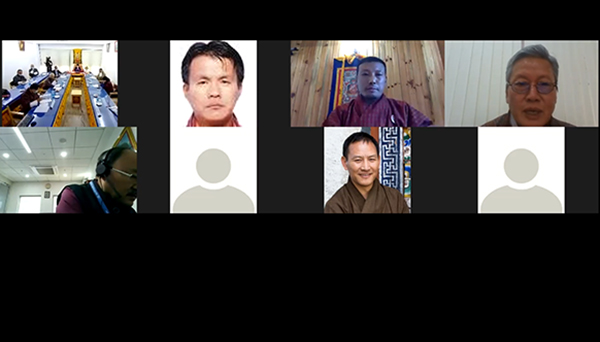 Bhutan has made concerted efforts in making sure the healthcare services are free, equal and available to all. But are the services always available in the most efficient and equitable manner? Have people in the country regardless of their income levels and status enjoyed access to the same health services? In the Health Policy dialogue webinar held yesterday, the participants raised that health equity requires attention.
Bhutan has made concerted efforts in making sure the healthcare services are free, equal and available to all. But are the services always available in the most efficient and equitable manner? Have people in the country regardless of their income levels and status enjoyed access to the same health services? In the Health Policy dialogue webinar held yesterday, the participants raised that health equity requires attention.
Health equity is when everyone has a fair and just opportunity to be healthy.
All the speakers in the webinar voiced that despite free healthcare, disparities exist in access, utilisation of health services and health outcomes between urban and rural areas, income levels, districts and between regions.
“I think in Bhutan one could say that in terms of policy and paper there is equality and what we are aspiring through forums like this is equity and what is really happening on the ground in reality. We know those who are well off, they have better access to fast, free and first-class services whereas the underprivileged are the ones who are deprived of it. So how do we really level that?” voiced Karma Phuntsho (PhD), the Founder and President of Loden Foundation.
According to the Poverty Analysis Report 2017, poverty is still a rural phenomenon with a poverty rate of about 12 per cent. Poor people in the country use fewer specialised services whereas rich people use more specialised services as they have access to free services due to their socioeconomic status.
“If we look at the consumption of health services in the country, there is a huge inequity in consumption. The richer you are, the more affluent you are, you tend to consume more health services. More educated you are, you tend to consume more health services. You will get your blood work done three times within a week. So I think these are the inefficiencies of our health system and I think this is a great opportunity to enhance these inefficiencies and improve these inefficiencies so that we are able to, at the end of the day, deliver really people-centric care,” said Dechen Wangmo, the Health Minister.
Dr Pem Namgyal, another speaker of the webinar said, an unmanaged healthcare system cannot have equity or optimal improved outcomes. He said currently the management of the flow of patients at different levels of primary, secondary and tertiary is not defined. And as a result, this leads to underutilisation in the primary or the secondary level whereas it increases the burden at the tertiary level
“People say, ‘well I can get my headache treated in the BHU as well as in JDWNRH, so I will go to JDWNRH’ because we haven’t defined what services are available and should be accessible at a BHU level or at a district hospital level. So to educate and communicate to the community to understand the system that what services are available at what level, how to access them and what is the relevance of that to their needs is what we have to communicate. But we cannot communicate because we don’t have that package,” said Dr Pem Namgyal, the Director. Programme Management with the WHO/South-East Asia Region.
Besides, there is also a need to review policies and develop strategies to improve the country’s health system that is not just free but equitable, accessible and available.
“Because of the benevolent leadership of our Monarchs, we have been very fortunate to have a health system, access to health system protected by our constitution but till date, the interpretation of that provision of the constitution has been very limited and it has not been attempted. So that requires, of course, a legislative move and that entails the health bill which has been in discussion for many years. And we hope that at least during our tenure we hope to table it and similarly we would also like to really assure the nation that we are also looking at having a very progressive health policy,” the Health Minister added.
“As a legislator and a Member of Parliament, I feel we need to review health policy which has not been reviewed for the last ten years, I believe. And I have briefly gone through the policy and I found out that there is no strong statement in terms of reducing inequity in health. We also need to develop tools and make it part of the annual health reporting,” said Ugyen Namgay, a Member of Parliament for the National Council.
Khesar Gyalpo University of Medical Sciences of Bhutan organised the policy dialogue webinar to recommend innovative policy solutions in addressing the current gaps to equitable access to health care delivery.
Sonam Pem






